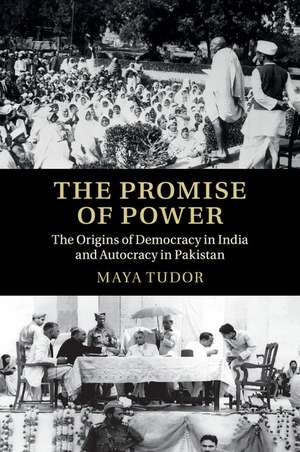The Promise of Power: The Origins of Democracy in India and Autocracy in Pakistan
Autor Maya Tudoren Limba Engleză Paperback – feb 2017
| Toate formatele și edițiile | Preț | Express |
|---|---|---|
| Paperback (1) | 283.41 lei 43-57 zile | |
| Cambridge University Press – feb 2017 | 283.41 lei 43-57 zile | |
| Hardback (1) | 753.40 lei 43-57 zile | |
| Cambridge University Press – 13 mar 2013 | 753.40 lei 43-57 zile |
Preț: 283.41 lei
Nou
Puncte Express: 425
Preț estimativ în valută:
54.23€ • 56.77$ • 44.87£
54.23€ • 56.77$ • 44.87£
Carte tipărită la comandă
Livrare economică 07-21 aprilie
Preluare comenzi: 021 569.72.76
Specificații
ISBN-13: 9781316635247
ISBN-10: 1316635244
Pagini: 258
Ilustrații: 8 b/w illus. 3 maps 1 table
Dimensiuni: 154 x 230 x 15 mm
Greutate: 0.35 kg
Editura: Cambridge University Press
Colecția Cambridge University Press
Locul publicării:Cambridge, United Kingdom
ISBN-10: 1316635244
Pagini: 258
Ilustrații: 8 b/w illus. 3 maps 1 table
Dimensiuni: 154 x 230 x 15 mm
Greutate: 0.35 kg
Editura: Cambridge University Press
Colecția Cambridge University Press
Locul publicării:Cambridge, United Kingdom
Cuprins
1. How India institutionalised democracy and Pakistan promoted autocracy; 2. The social origins of pro- and anti- democratic movements (1885–1919); 3. Imagining and institutionalizing new nations (1919–47); 4. Organizing alliances (1919–47); 5. Freedom at midnight and divergent democracies (1947–58); 6. The institutionalization of alliances in India, Pakistan, and beyond.
Recenzii
'Acknowledging the importance of political parties to regime stability, Tudor moves further back the causal line of explanation by examining the conditions under which particular political parties first came into being and institutionalized the support of key elites. This monograph sheds new light on the origins of some of the systemic institutional, ideological and identity issues of India's and Pakistan's respective political regimes.' Rosheen Kabraji, International Affairs
'This is a carefully researched and clearly written study that not only makes a compelling argument but also offers perceptive insights into the history of the Indian and Pakistani political movements. While the broader political and social contexts that accompany the narratives in the chapters are not necessarily new to readers familiar with the political history of India and Pakistan, the author must be commended for the convincing manner in which the historical conditions and circumstances in the lead up to 1947 and beyond are marshaled to support her overarching argument … this illuminating book is an enjoyable read … [It] is a valuable study that has much to offer to those wishing to comprehend the political dynamics of India and Pakistan. It is, at the same time, an important contribution to the literature on the challenges of democratization in postcolonial developing countries.' Tan Tai Yong, Pacific Affairs
'This is a carefully researched and clearly written study that not only makes a compelling argument but also offers perceptive insights into the history of the Indian and Pakistani political movements. While the broader political and social contexts that accompany the narratives in the chapters are not necessarily new to readers familiar with the political history of India and Pakistan, the author must be commended for the convincing manner in which the historical conditions and circumstances in the lead up to 1947 and beyond are marshaled to support her overarching argument … this illuminating book is an enjoyable read … [It] is a valuable study that has much to offer to those wishing to comprehend the political dynamics of India and Pakistan. It is, at the same time, an important contribution to the literature on the challenges of democratization in postcolonial developing countries.' Tan Tai Yong, Pacific Affairs
Notă biografică
Descriere
An examination of how, despite similar historical contexts, India became a stable democracy post-independence, whilst Pakistan became an unstable autocracy.
